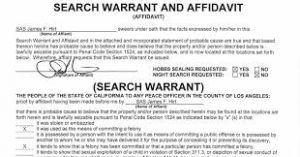The Supreme Court of the United State’s ruling in Birchfield v. North Dakota has resulted in countless appeals all over the country, as defense attorneys and prosecutors try to discern the implications of the ruling. One issue that frequently arises is whether the refusal to undergo a blood test without a warrant is admissible to prove guilt at a trial for DUI charges. The Nebraska Supreme Court recently addressed this issue in Nebraska v. Hood, ruling that Birchfield did not prohibit the introduction of such evidence. If you are charged with a DUI and refused to undergo a warrantless blood test, it is important to know your rights. A seasoned Illinois DUI attorney can assist you in analyzing what defenses may be available to the charges you face.
Facts of the Case
Allegedly, the suspect in Hood was driving a vehicle involved in a two-car collision. The driver of the other vehicle died at the scene and a passenger from the other vehicle died 9 days later. An off-duty police officer arrived at the scene shortly after the accident and observed a strong odor of alcohol on the suspect’s breath. An officer who responded to the accident drove the suspect to the hospital. The responding officer also noted alcohol on the suspect’s breath and observed that the suspect’s speech was slurred and his eyes were bloodshot. An open bottle of liquor was found in the suspect’s vehicle as well. When he was asked if he had been drinking the suspect stated he had consumed four beers the night before. He was asked to undergo a preliminary breath test and refused. He was then asked to undergo a blood test and refused that as well.
Purportedly, a physician’s assistant subsequently withdrew blood from the suspect, with the suspect’s consent, to diagnose and treat the suspect. The police subsequently subpoenaed the suspect’s blood and urine samples. The suspect moved to suppress the samples prior to trial, which the court granted. During the trial, the suspect moved to preclude evidence of his refusal to submit to the breath test, based on Birchfield. The court denied the suspect’s motion on the grounds that Nebraska law permits evidence of refusal to submit to chemical testing prove a DUI charge.
The suspect was convicted of motor vehicle homicide, manslaughter, driving under the influence of alcohol causing serious bodily injury and refusal to undergo a preliminary blood test. He appealed, alleging in part that the court erred in admitting evidence of his refusal to undergo a blood test.
Nebraska Supreme Court Ruling
On appeal, the Nebraska Supreme Court affirmed the trial court ruling. The court declined to adopt the suspect’s reasoning that even though the accident occurred prior to Birchfield, the trial was held after Birchfield, and therefore, evidence of his refusal to undergo a blood test should not have been submitted to the jury. The court noted this argument was in contravention of a state statute, which provided that refusal to submit to chemical testing was admissible evidence to prove a DUI charge. Although the suspect did not argue that the statute in question was unconstitutional, the court held that it did not violate any constitutional rights, due to the fact that there are circumstances for which a conviction for a refusal to submit to testing would be valid, even after Birchfield. For example, the court noted that Birchfield did not prohibit a blood test obtained without a warrant when the driver consented to the test. The court ultimately held that evidence of the suspect’s refusal to undergo a warrantless blood test is admissible in a DUI prosecution, and affirmed the trial court ruling.
Illinois Law Regarding Evidence of Refusal to Undergo a Blood Test
While several other states have addressed the issue of whether a refusal to undergo a warrantless blood test can be introduced as evidence of guilt of a DUI charge, Illinois appellate courts have not yet ruled on this issue. Under Illinois implied-consent law, all licensed drivers are deemed to consent to chemical testing. Presumably, the issue of whether evidence of a refusal to undergo a blood test is admissible evidence in a DUI trial will arise in the Illinois courts in the near future.
Consult an Experienced Illinois DUI Attorney Today
If you refused to undergo a blood test and are charged with a DUI, it is important to understand the charges you face and potential penalties. It is in your best interest to confer with a knowledgeable Illinois DUI attorney as soon as possible, to develop a defense and ensure you do not waive any rights. Harvatin Law Offices, PC works tirelessly to defend individuals charged with DUI throughout Illinois. Contact our office at 217.525.0520, to schedule a consultation.
More Blog Posts:
Wyoming DUI Suspects Who Refuse to Comply with Warrants for Blood Tests Charged with Interference with a Peace Officer Illinois DUI Lawyer Blog, October 12, 2018.
Vermont Supreme Court Holds Refusal to Submit to Blood Test Admissible as Evidence of Guilt Illinois DUI Lawyer Blog, September 13, 2018.
Kansas Courts Rule Computer Generated Translation Insufficient to Confer Consent Illinois DUI Lawyer Blog, July 12, 2018.
 Illinois DUI Lawyer Blawg
Illinois DUI Lawyer Blawg


